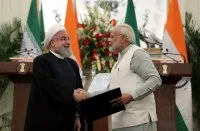The US media continues its mindless collective obsession over Congresswoman Alexandria Ocasio-Cortez of the Democratic party. In many ways, Ocasio-Cortez is the liberal version of Donald Trump for the following reasons:
-Both enjoy goading their respective bases with radical policies which challenge a long held political consensus as well as challenging common sense
-Both have a knack for proposing unrealistic programmes that have a populist appeal that is largely free from self-criticism and introspection
-Both are self-proclaimed enemies of political, economic and social moderation
-Both are adept at using controversial language and social media in order to attract attention under the principle of Oscar Wilde’s maxim that “There is only one thing in the world worse than being talked about, and that is not being talked about”.
-Both are able to bush off the utterances of factually unsubstantiated statements with a similar kind of confidence that begets arrogance
-Both have built their political career largely on social media rather than real life experience
In this sense, while Ocasio-Cortez has frequently professed her hatred for Trump and while Trump’s supporters enjoy targeting Ocasio-Cortez, both politicians use similar tactics and exhibit similar personality traits, albeit in order to promote radically different agendas.
Ocasio-Cortez wants to return to the outlandish 70%+ income tax of the 1970s stagflation era and she likewise advocates the passing productivity killing economic regulations. On the other hand, Trump is happy to run up the deficit to historic highs amid a deeply counter-productive trade war with China and other trading partners. Yet in spite of these self-evidently boorish, out of touch and simplistic economic formulas, both have become darlings of the media, while at the same time, sound moderate voices like those of Ron and Rand Paul continue to receive less air time.
From the point of view of media owners and managers, it is clearly in their interests to give air time to outspoken, audacious, stupid, flamboyant and self-styled controversial politicians at the expense of more sound ones for the same reason that people watch videos of car crashes in higher numbers than they watch videos of lectures on economic theory.
But while Socrates and Plato realised the tendency of a democratic society to sink to the depths of public vulgarity long before the age of mass media, there does exist a form of political democracy that can moderate the effects of the vulgar tendencies of mass media without sacrificing popular political representation. In countries with parliamentary systems ranging from Malaysia and Singapore to Germany and The Netherlands, people like Trump and Ocasio-Cortez have a much harder time attaining power.
Parliamentary systems necessarily foster a cooperative atmosphere wherein a meritocratic based rise to party leadership exists in place of the bloated beauty contests that are presidential systems in which one can win a national election without having to work with colleagues, let alone have any real political experience. Because of this, those who are effective at reaching win-win compromises within a party structure, those who can navigate through the criticism of parliamentary colleagues and constituents while promoting ideas based manifestos before the electorate, tend to rise to the top. By contrast, in presidential systems, the man or woman who can court the most media attention (often by flaunting their stupidity or vulgarity as Trump and Ocasio-Cortez excel at doing) can find that a rapid rise to the top can occur without any political work being accomplished in any sense, prior to entering a top leadership position.
This is not to say that clownish Ocasio-Cortez style characters do not exist in parliamentary systems. In Britain, former Foreign Secretary Boris Johnson is often portrayed as overly flamboyant and too clownish for his own good. Perhaps this is why he has yet to attain the top office of Prime Minister. That being said, because the parliamentary system is one where one can constantly prove one’s worth in real time political debates involving specific policy issues, Johnson could yet redeem himself by proving his merits within the parliamentary chamber in which he is currently a backbencher.
Just as outlandish characters can indeed prove their meritocratic value to the nation after years of work in a parliamentary chamber, so too can celebrities become heads of government for the same reason. Indeed, Pakistan’s reformist Prime Minister Imran Khan rose to the top not in a single presidential election based on his celebrity past, but instead based on decades of work within the framework of parliamentary politics that eventually delivered the goods. After years of Imran Khan working tirelessly to build his PTI party within the framework of a parliamentary system that between 2001 and 2007 was subsumed by the presidential dictatorship of Pervez Musharraf, in 2018 Pakistan got the anti-dynastic, pro-reform leadership that millions had wanted for over a decade.
Thus, while parliamentary systems allow for the meritocratic rise of men and women, celebrities and non-charismatic but capable technocrats, the young and old, the left and the right - what they do not allow for is the rise of one limelight hogging clownish public figure with little or no experience to an immediate leadership position.
Furthermore, while it is true that congressional/presidential systems do indeed have political debates that can test one’s ability, it is well known that throughout the world, congressional style debates tend to be far less robust than those conducted in adversarial parliamentary systems. This is why for example, someone as totally unimpressive, uninformed and incapable as Noynoy Aquino was able to rapidly become the President of The Philippines after a totally unimpressive congressional career. In the US, the exact same thing remains a possibility for the equally untalented but very blustery Alexandria Ocasio-Cortez.
By contrast, as Singapore looks for a new leader of the ruling People’s Action Party, the selection process is taking place in a calm, orderly and businesslike manner that seeks to find the most capable rather than the most outrageous candidate. This is thanks to a disciplined and meritocratic system created by Singapore’s founder Lee Kuan Yew. While Lee died in 2015, there is little doubt that he would be horrified by the prospect of either Donald Trump or Alexandria Ocasio-Cortez leading the US into economically unsound ruin.
In the modern age of mass media and social media, clowns will naturally hog the spotlight, but in parliamentary systems, there are crucial checks and balances which prohibit such people from seizing the leadership without proper scrutiny - the likes of which would see most such figures exposed as fatuous fools rather than sound, intelligent potential leaders.




